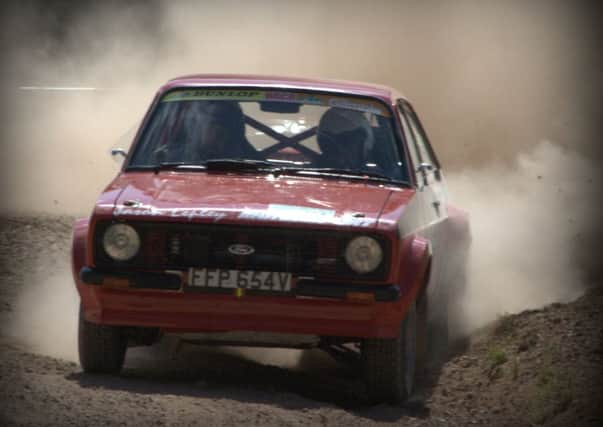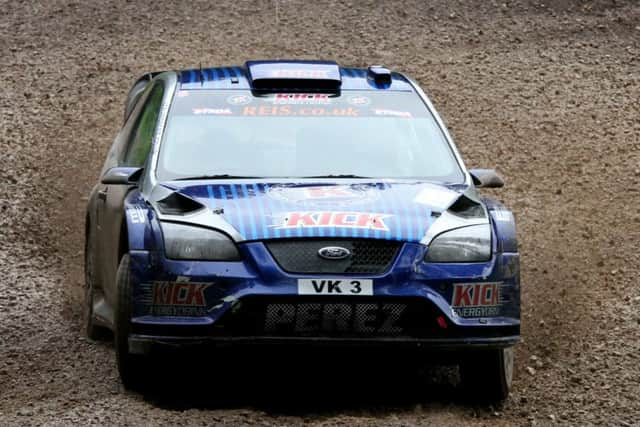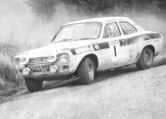Dukeries Rally shock as axe falls


The rally has enjoyed massive support from thousands of local spectators over the years and from others who have travelled from all over the country to watch it
But, after discussions with the Forestry Commission, organisers Dukeries Motor Club have confirmed that due to increasing leisure and environmental pressures, rallying in the Sherwood Forest area will in future be restricted to the autumn and winter months. The environmental concerns of the authorities centre on ground nesting birds, glow worms, ancient oaks and woodlarks, to name but a few, many of which have appeared during the last few years, despite rallying occurring at least once per year.
Advertisement
Hide AdAdvertisement
Hide AdSherwood Pines leisure activities have grown over the years and it is now heavily used for numerous other activities.


The biggest loss will be to the local economy. It is estimated that the rally brings around £300,000 into the local economy over the weekend, not only from what the competitors and spectators spend on food, fuel and accommodation but also what the event spends on hiring the venues such as Southwell Racecourse and the wages it pays to its staff during the two days.
Organised by the Dukeries Motor Club, the rally is one of the oldest stage rallies in the UK.
Club chairman David Baugh said: “The Dukeries Rally is different from many other stage rallies in that the forests it uses have many owners and are managed on long term lease agreements by the FC.
Advertisement
Hide AdAdvertisement
Hide Ad“This multi ownership combined with the involvement of an increasing number of other organisations unconnected with motorsport has made it progressively more difficult to organise a successful event.”


Over its previous 55 years the rally has evolved several times, firstly from being just a road rally and then to a mixed road and stage event and eventually to a total stage event.
Bob Draper, club secretary and the rally’s clerk of the course for 20 years, said: “We have to be positive and remind people that the sport has to change with the times and Dukeries Motor Club are very hopeful that the Dukeries Rally will evolve into something new and exciting.
“When I first became involved with the event in the late 70s it ran at night and contained 22 stages spread over airfields, farm tracks and forests throughout Nottinghamshire.
Advertisement
Hide AdAdvertisement
Hide Ad“It was completely different to the event of recent years. It has also moved about during the year from September to March and then to June.”
“Dukeries Motor Club is proud of the history of the Dukeries Rally and wishes to record its immense gratitude to the event organisers, officials and marshals who created, developed and maintained the event over so many years.
“Thanks also go to the many thousands of competitors who have supported the Dukeries Rally over the years and provided a justification for all the hard work and commitment from the organisers.”
This year’s rally earlier this month was won by Chesterfield VK drinks entrepreneur Steve Perez and last year’s rally’s winning co-driver Paul Spooner in their VK Energy-sponsored Ford Focus WRC.
Advertisement
Hide AdAdvertisement
Hide AdThey held onto the lead for most of the day, winning nine out of the day’s 10 special stages.
On a positive note the popular S.A. Gas Premier Rally and Premier Historic Rally still takes place this year on Sunday, 23rd November 2014 at Sherwood Pines Forestry Complex near Kings Clipstone, Nottinghamshire as a single venue rally.
Find out more about Dukeries Motor Club’s activities and about becoming a member on their website http://www.dukeries-motorclub.co.uk.
For an in-depth look back at the history of the Dukeries Rally – see www.chad.co.uk.
Advertisement
Hide AdAdvertisement
Hide AdRally History – The Dukeries Rally one of the oldest stage rallies in the UK
The ever popular event is part of the REIS BTRDA Rally Series and has been a round of it for 47 years.
1960 saw the first Dukeries Rally with a ‘restricted’ RAC permit, although there had been a ‘closed to club’ event with this title the previous year.
The event ran on October 16th 1960 as a night road rally using the local roads in Nottinghamshire and had an entry fee of £0-15s-0d (75p).
Advertisement
Hide AdAdvertisement
Hide AdIt was immediately seen as a potential round of the fledgling East Midlands Association of Motor Clubs Rally Championship which it entered in 1961. Jim Porter’s recollections of these early events were of : “Tricky navigation with 50 car entries using Ford Anglias and 850 Minis trying to find the correct route amongst the maze of ‘not as map’ roads and tracks within Clumber Park.”
In an effort to find more competitive rally territory the event moved into Derbyshire during the mid-1960s and by 1967 the organisers added special stages to an already tough event.
By 1969 the reputation of the event for good organisation had attracted the BTRDA Silver Star Championship and in 1970 the event was upgraded to National and was a qualifying round of the Motoring News Castrol National Championship and the BTRDA Gold Star Championship.
1970s - A typical rally itinerary of this period taken from the event was: Early evening start from Nottingham, five stages south of Nottingham including Donington (before the race circuit was rebuilt) and the road around Blackbrook Reservoir.
Advertisement
Hide AdAdvertisement
Hide AdA fuel halt at Hulland, followed by six selectives in Derbyshire/Staffordshire. After the first leg, the leader was Brian Bell (yes the same Brian Bell who won the event 22 years later) who also set fastest time on the first selective before retiring with a broken half shaft.
Another fuel halt at Buxton followed by five more selectives in Derbyshire.
Fuel in Matlock at dawn and then six forest stages in Felley, Annersley, Harlow, Strawberry Hill and Clipstone and further stages at Lamb Pens, MOD land at Bilhaugh, and finally three laps of Scofton Airfield.
The finish was at The Old Bell, Barnby Moor for a late breakfast and awards.
Advertisement
Hide AdAdvertisement
Hide AdThe total distance was just over 400 miles and in that year the event was won by Chris Benyon and Lyn Andrews in a Ford Escort Twin Cam.
By 1972 the event was part of the British National Championship and had moved to an all stage format. (Entry fee £10).
However, to obtain the required 80+ stage miles the event had to make use of some disused airfields and farm roads on the Nottinghamshire/Lincolnshire border to supplement the Forestry stages in Sherwood Forest. This was the era dominated by Roger Clark/Jim Porter in the Esso Uniflow Escorts. (LVX 941J).
1976 saw radical changes when the event was rescheduled in March (only five months after the 1975 event) and started at midnight on Saturday from the new Idlewells Centre in Sutton in Ashfield, with half of the stages run in the dark before a lunchtime finish back at the Idlewells Centre.
Advertisement
Hide AdAdvertisement
Hide AdAlthough this night time format had many advantages and provided competitors with an extra challenge, there were a number of significant drawbacks and by 1978 the event had returned to the more usual Saturday daylight format.
1979 was another notable year when, in addition to the BTRDA and East Midlands Championships, the event was a round of the Ford Escort 1300 Championship and the Fabergé Fiesta Ladies Challenge. Some 270-plus entries were received for the 130 starting places. During the late 1970s and early 80s the event gradually became more compact and used fewer non-forest stages.
This process was helped by two organisational successes - obtaining use of a five mile stage in the Birklands, known as ‘Portland’ in recognition of the freehold owner Portland Estate, and also the use of the mixed surface roads in Clumber Park, owned and managed by the National Trust.
This was the format used for the Dukeries Silver Jubilee Rally in 1984. (Entry fee £83).
Advertisement
Hide AdAdvertisement
Hide AdFrom 1987 to 2006 the event was based at the Mansfield Civic Centre for the start, finish and Rally HQ and used 45 miles of special stages in Sherwood Forest. The Dukeries Rally connections with the BTRDA go back to 1969 when the event was part of the then BTRDA Silver Star Championship.
When BTRDA revised its Gold Star Rally Championship in 1972, the Dukeries was included, and during the 1970s and early 1980s the Dukeries Rally winner often went on to become the BTRDA Gold Star Rally Champion (Trevor Smith, Pete Doughty).
Changes to the BTRDA Championships in 1987 saw the Dukeries Rally become part of the very first BTRDA Clubman’s Championship.
Six years later with the creation of the BTRDA Rally Series in 1993, the Dukeries Rally was again a round of both the Gold Star and Silver Star Championships, with the Formula 2 cars running in advance of the non F2 cars.
Advertisement
Hide AdAdvertisement
Hide AdThe 1994 Dukeries Rally was voted ‘best event’ in the BTRDA Rally Series and again in the 1990s several winners of The Dukeries went on to become BTRDA Champions including Matthew Clark, Andy Burton, Brian Bell.
The 2001 Dukeries Rally was the first forest stage rally to run in the UK after the foot and mouth epidemic had stopped all rallying for four months.
The event attracted a full entry in just five days and was won by the then National Champions Marcus Dodd/John Binnie in a Subaru Impreza.
Until 2002 only one crew had won the Dukeries Rally three times; Roger Clark and Jim Porter in 1962, 1972 & 1973. The Clark family have scored five victories in total with Roger’s sons Matthew in 1993 and Oliver in 1997 following in the family tradition.
Advertisement
Hide AdAdvertisement
Hide AdHowever 2002 saw long time Dukeries club member Brian Bell equalling the Roger Clark record of three wins (1992, 1999 and 2002).
Brian is also surely the driver who has competed on the greatest number of Dukeries Rallies, 28 between 1966 and 2005.
2003 saw another team of hat-trick winners with Andy Burton/Rob Morgan in the fearsome Peugeot Cosworth, winning the event for the third time on their way to becoming the 2003 BTRDA Gold Star Champions.
Again in 2004 event winners Graham Middleton/John Morgan (Hyundai Accent WRC) went on to win the converted BTRDA Gold Star Championship. Graham and John came back in 2005 and repeated their Dukeries Rally victory.
Advertisement
Hide AdAdvertisement
Hide AdIn 2006 it was local businessman Steve Perez with Scott Martin in the VK Ford Focus WRC that won the event that Steve had first competed in as a co-driver back in 1983.
The 2007 event will be remembered for the thunderstorms of biblical proportions which flooded out the new Rally HQ at Southwell Racecourse and forced the cancellation of the Rainbow Hill stage. However, the event organisers overcame these challenges to run the event which was won by Will Nicholls / Nick Broom in a Subaru Impreza.
The 2008 Dukeries Rally was dominated by the Weston family from Aberdeen. Father Dave Weston won the event, accompanied by experienced co-driver Dave Robson while 17-year-old Dave Weston Jnr won the GpN class and was the highest-placed driver not in a World Rally Car.
For the Golden Jubilee event in 2009 the club made great efforts to mark 50 consecutive years of the Dukeries Rally and were rewarded with a full 150-car entry.
Advertisement
Hide AdAdvertisement
Hide AdSteve Perez accompanied by Sam Collis proved just too good on a day when many of the leading BTRDA crews fell by the wayside.
Steve Perez completed his hat-trick in 2010, this time accompanied by Paul Spooner, who also notched up his third win as a co-driver. Sadly the event was overshadowed by the fatal injury to the driver of car 204, Martyn Lewis.
Previous sponsors since 1969 have included BP, Esso Uniflow, Harrisons of Lowdham and Sutherland Foods, the partnership with Rainworth Skoda being the longest in the rally’s history.